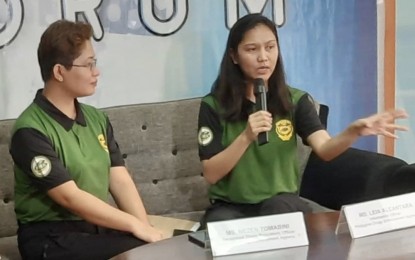
ANTI-DRUG BODY. Philippine Drug Enforcement Agency (PDEA)-Central Visayas information officer, Leia Alcantara (right) emphasizes a point as Nezen Tomabini, regional drug regulation officer, listens during the Association of Government Information Officers-Philippine Information Agency-7 forum in Cebu City on Tuesday (Feb. 18, 2020). Alcantara reminded leaders of drug-cleared villages to make their Barangay Anti-Drug Abuse Council (BADAC) highly functional to retain the status. (PNA photo by John Rey Saavedra)
CEBU CITY – The Philippine Drug Enforcement Agency (PDEA) in Central Visayas on Tuesday reminded leaders of drug-cleared villages to maintain a “highly functional” anti-drug abuse council to retain the status.
In a media forum here, Leia Alcantara, PDEA-7 information officer, said re-evaluation of barangays previously declared as drug-cleared is ongoing to check if village officials are diligent in meeting the requirements to retain their status.
“If they are cleared in 2017 but during revalidation, they have low-functioning BADAC (Barangay Anti-Drug Abuse Council), for example, if they are required to meet once a month, their meeting is once every quarter or once every year, that is an indication that they failed to maintain the drug-cleared status,” she said.
The villages, she said, are required to hold demand-reduction operations in their respective jurisdiction as part of the conditions in maintaining their drug-cleared status.
In the event a drug personality resurges in a barangay, the officials of BADAC are given the chance to take a concrete action by coordinating with the PDEA and the Philippine National Police for the immediate anti-illegal drug sting operation.
“It does not mean that if there is a resurgence of a drug personality, we automatically get back your drug-cleared status. We will give you the chance to show what is the action taken through an anti-drug operation,” Alcantara said.
She added that the Dangerous Drugs Board (DDB) also mandates for the delisting of barangays that are previously declared drug-cleared and later found during re-evaluation to have failed to keep their anti-drug council functional.
Alcantara revealed that of the 3,003 barangays in Central Visayas, at least 855 have been drug-cleared.
However, more than 500 villages underwent revalidation as barangay officials met with drug surrenders and the PDEA-7 personnel held a face-to-face interaction with the stakeholders on the ground.
Alcantara said the Department of the Interior and Local Government (DILG) has been doing a performance audit of BADACs in the region starting this month until March.
In October 2019, the Regional Oversight Committee on Barangay Drug Clearing Program (ROC-BDCP) evaluated the application of 44 barangays in Region 7 and bestowed drug-cleared status to 36 villages.
ROC-BDCP is mandated under DDB Regulation No. 3 series of 2017 to “be responsible in declaring a barangay as drug-free after satisfying all the parameters of drug-cleared barangay”.
The DDB issuance also tasked the committee to ensure sustainability of the program and status of drug-cleared or unaffected barangays through monitoring of anti-drug initiatives of all local government units, as well as investigate villages found having drug-related activities.
Villages declared as “drug-cleared” but were found later with illegal drug activities would be given 30 days “to take appropriation action” and failure shall be a ground for the oversight committee to declare them again as “drug-affected barangay”.
Pursuant to DDB Regulation No. 3, Series of 2017, BDCP is designed to capacitate the barangays in effectively addressing the drug problem in their areas with the assistance of government agencies such as PDEA, DILG, Philippine National Police, and the Department of Health. (PNA)
